

Five Steps To Get The Right Deal For You. How To Find Fulfilling Work: 6 Practical Lessons. The idea of fulfilling work — a job that reflects our passions, talents and values — is a modern invention.
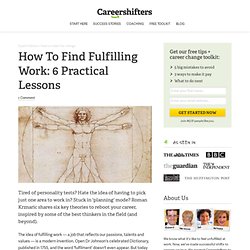
Open Dr Johnson's celebrated Dictionary, published in 1755, and the word 'fulfilment' doesn't even appear. But today our expectations are higher, which helps explain why job satisfaction has declined to a record low of 47% in the US, and is even lower in Europe. If you count yourself amongst those who are unhappy in their job, or at least have that occasional niggling feeling that your work and self are out of alignment, how are you supposed to go about finding a meaningful career? What does it take to overcome the fear of change and negotiate the labyrinth of choices, especially in tough economic times? Here are six pieces of essential wisdom drawn from some of the best brains in the field. 1. First, a consoling thought: being confused about career choice is perfectly normal and utterly understandable. Then add to this our in-built aversion to risk. 2. 3. 4. 5. 6.
Advice article - Turn the tables: questions to ask at an interview. When your half-hour interrogation at the hands of the interviewer is at an end it is your turn to pose the questions.
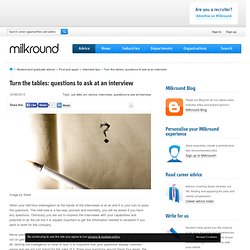
The interview is a two-way process and inevitably, you will be asked if you have any questions. Obviously you are out to impress the interviewer with your capabilities and potential to do the job but it is equally important to get the information needed to establish if you want to work for the company. Never pass up the opportunity to ask the interviewer questions. If you do, not only will you miss out on gaining useful additional information, but you will seem disinterested, passive and, worst of all, lacking the intelligence to think of any! Why do you want to work for us? Confident interview answers. “What attracts you to this company and why is this graduate scheme right for you?”
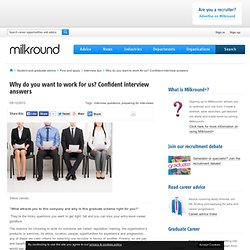
They’re the tricky questions you want to get right; fail and you can kiss your entry-level career goodbye. The reasons for choosing to work for someone are varied: reputation, training, the organisation’s products or services, its ethos, location, people, opportunities for experience and progression… any of these are valid criteria for selecting one recruiter in favour of another. Frankly, so are pay and benefits, although you wouldn’t say so to an employer and it’s unlikely that one organisation would pay enough over average to the extent it’s a deal-breaker. Five top tips for using job boards effectively. Make sure you don't delay by being first to get your application in.
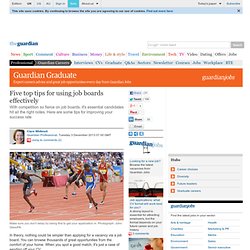
Photograph: John Giles/PA In theory, nothing could be simpler than applying for a vacancy via a job board. You can browse thousands of great opportunities from the comfort of your home. When you spot a good match, it's just a case of sending off your CV. But with competition so fierce, employers are often swamped by CVs and have little time to read each one in detail. Understand the process. Why Your Job Cover Letter Sucks (and what you can do to fix it)
For the next few months I will be posting the “best of the best” Professor is in blog posts on the job market, for the benefit of all those girding their loins for the 2013-2014 market.
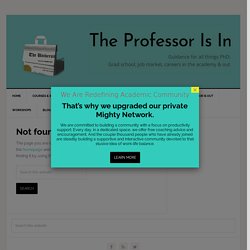
Today’s post was originally published in 2011. I’ve now read about two thousand more job letters than I mention here. All the advice still applies. In my 15 years as a faculty member I served on approximately 11 search committees. Some of these search committees I chaired. Estimating that each search brought in an average of 200 applications (a conservative estimate for a field like Anthropology, a generous estimate for a much smaller field like East Asian Languages and Literatures), that means I have read approximately 2200 job applications.
That means I’ve read 2200 job cover letters. I’ve also read the cover letters of my own students, and a passel of Ph.D. students who came to me for advice, as well as a large number of clients since opening The Professor is In (as of July 2012 let’s say 600). 1. 2. 3. What Makes A Great Cover Letter, According To Companies? Advertisement Ah, the dreaded cover letter.
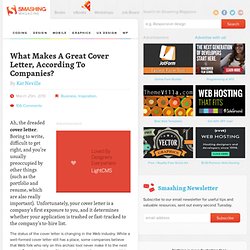
Boring to write, difficult to get right, and you’re usually preoccupied by other things (such as the portfolio and resume, which are also really important). How to stand out with your covering letter. Your covering letter links your CV to the specific requirements of the job and the company.
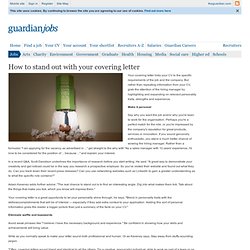
But rather than repeating information from your CV, grab the attention of the hiring manager by highlighting and expanding on relevant personality traits, strengths and experience. Make it personal Say why you want the job and/or why you're keen to work for the organisation. Perhaps you're a perfect match for the role, or you're impressed by the company's reputation for great products, services or innovation. If you sound genuinely enthusiastic, you stand a much better chance of wowing the hiring manager.
Here’s an example of a great cover letter. A reader recently sent me one of the best cover letters I’ve ever seen, and she nicely agreed to allow me to reprint it here in case it inspires anyone else.
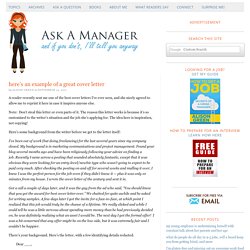
Note: Don’t steal this letter or even parts of it. The reason this letter works is because it’s so customized to the writer’s situation and the job she’s applying for. The idea here is inspiration, not copying! The Mind Trick That Will Change the Way You Write Cover Letters Forever. Finally.
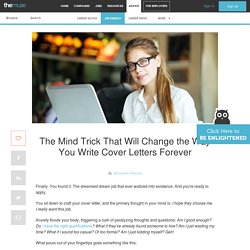
You found it. The dreamiest dream job that ever waltzed into existence. And you're ready to apply. You sit down to craft your cover letter, and the primary thought in your mind is: I hope they choose me. I really want this job. Anxiety floods your body, triggering a rush of paralyzing thoughts and questions: Am I good enough? What pours out of your fingertips goes something like this: Dear Sir or Madam, List of Resume and Cover Letter Action Keywords. Do you need keywords to use in your resume and cover letters?
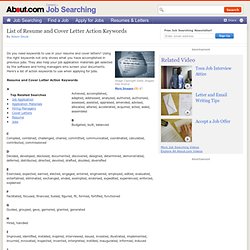
Using the right keywords not only shows what you have accomplished in previous jobs. They also help your job application materials get selected by the software and hiring managers who screen your documents. Here's a list of action keywords to use when applying for jobs. Key Words For Resume and Cover Letter Construction.
Eight Toughest Interview Questions. How to identify your work skills.